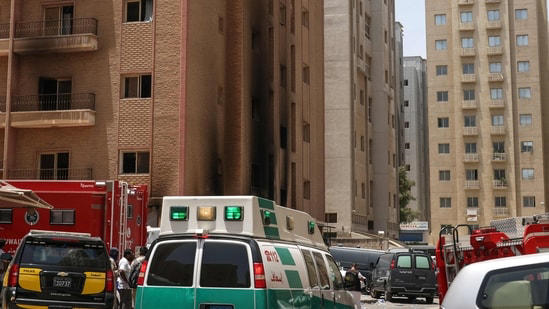The recent fire disaster in Kuwait has left an indelible mark on the hearts of many, particularly within the Indian community. As news broke of the tragic loss of 40 Indian lives, a controversial statement by a Kuwaiti minister blaming greed for the incident added fuel to an already blazing inferno of grief and outrage. This article delves into the details of the Kuwait Fire Disaster, exploring the minister’s remarks, the impact on the victims and their families, and the broader implications for worker safety and accountability.
Background of the Kuwait Fire Disaster
The Incident
The fire erupted in a residential area of Kuwait, where many Indian workers were housed. The flames spread rapidly, causing extensive damage and claiming 40 lives. The exact cause of the fire is still under investigation, but initial reports suggest that inadequate safety measures may have played a significant role.
Location and Date
The disaster struck a densely populated area known for housing migrant workers. The incident occurred on [specific date], marking a day of unprecedented sorrow for the affected families and communities.
Initial Response
Emergency services responded swiftly, but the scale and intensity of the fire made rescue operations incredibly challenging. Despite their best efforts, many lives were lost, and the survivors were left with nothing but the clothes on their backs.
Minister’s Controversial Statement
Summary of the Minister’s Remarks
In the aftermath of the tragedy, a Kuwaiti minister made a statement attributing the disaster to greed. According to the minister, the relentless pursuit of profit led to compromised safety standards, ultimately resulting in the catastrophic loss of lives.
Timing and Context
The minister’s statement was made shortly after the incident, at a time when emotions were running high. The timing and bluntness of the remarks have sparked significant debate and controversy.
Public Reaction
The public reaction to the minister’s statement has been mixed. While some agree that greed and negligence are to blame, others feel that the statement oversimplifies a complex issue and shifts the focus away from systemic failures that need to be addressed.
Root Cause: Greed
How Greed Led to the Tragedy
The minister’s accusation of greed points to a broader issue of prioritizing profit over safety. This disaster has brought to light the dangerous conditions that many migrant workers endure in their quest for better opportunities.
Negligence and Safety Violations
There were numerous safety violations in the building where the fire occurred, including a lack of fire exits, poor maintenance, and overcrowded living conditions. These factors created a deadly environment for the residents.
Impact on Worker Safety
The disaster has highlighted the precarious situation of migrant workers in Kuwait, who often face hazardous working and living conditions with little protection or recourse.
Impact on the Indian Community
Profiles of the Victims
The 40 Indian workers who perished were individuals with families and dreams. Their stories are a heartbreaking reminder of the human cost of negligence and greed.
Plight of Indian Workers in Kuwait
The incident has drawn attention to the broader issues faced by Indian workers in Kuwait, including exploitation, poor living conditions, and inadequate safety measures.
Reactions from India
The Indian government and community have expressed profound grief and called for better protections for their citizens working abroad. There have been numerous appeals for accountability and justice.
Response and Criticism
Government Response
The Kuwaiti government has promised a thorough investigation and measures to prevent future tragedies. However, many feel that these promises are too little, too late.
Criticism of the Minister’s Statement
Critics argue that the minister’s statement blaming greed deflects from the government’s responsibility to enforce safety regulations and protect workers.
Calls for Accountability
There are growing demands for accountability from both the Kuwaiti and Indian governments. Many are calling for stricter enforcement of safety standards and better support for migrant workers.
Safety Regulations and Enforcement
Existing Standards
Kuwait has safety regulations in place, but this disaster has exposed significant gaps in enforcement and compliance.
Failures in Enforcement
The fire has revealed a systemic failure to enforce existing safety regulations, putting workers’ lives at risk.
Recommendations for Improvement
- Stricter Enforcement: Ensure that all buildings comply with safety standards.
- Regular Audits: Conduct frequent inspections to identify and rectify safety violations.
- Harsher Penalties: Impose severe penalties for those who violate safety regulations.
Human Cost of Negligence
Personal Stories of Victims’ Families
The families of the victims are left to grapple with immense grief and loss. Their stories highlight the profound impact of the disaster on a personal level.
Long-term Impact
The economic and emotional toll on the victims’ families is significant. Many have lost their primary breadwinners and face uncertain futures.
Emotional Toll
The psychological impact of the disaster extends beyond the immediate families to the broader community, leaving a lasting scar.
Economic and Social Implications
Economic Impact on Families
The loss of 40 breadwinners has devastating economic consequences for the victims’ families, many of whom depended on their income for survival.
Broader Social Implications
The incident underscores the vulnerability of migrant workers and the need for better protections and support systems.
Impact on Kuwait’s Reputation
The disaster has tarnished Kuwait’s international reputation, raising questions about its treatment of migrant workers and adherence to safety standards.
Lessons Learned
Key Takeaways
The tragedy highlights the importance of prioritizing human lives over profits and the need for robust safety measures.
Importance of Safety
Ensuring the safety and well-being of workers should be a top priority for all employers and governments.
Steps Forward
Implementing stringent safety protocols and holding those responsible accountable are crucial steps in preventing future tragedies.
Future Outlook
Policy Changes
Potential changes in policy and regulation are being discussed to improve safety standards and protect workers.
Hopes for Better Standards
There is hope that this tragedy will lead to meaningful reforms and better protections for migrant workers.
Role of International Advocacy
International organizations and advocacy groups can play a crucial role in pushing for these changes and ensuring that workers’ rights are upheld.



